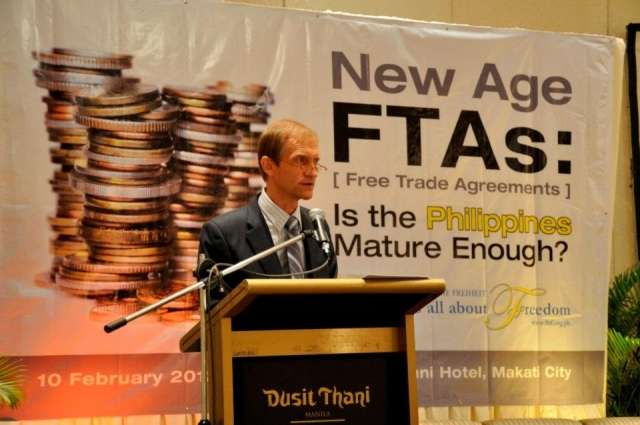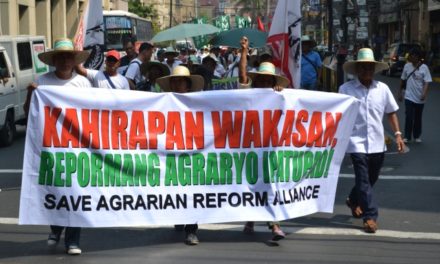A statement of Concern from the EU-ASEAN FTA Network-Philippines
12 February 2013
Against the backdrop of economic uncertainty in Europe, a comprehensive and ambitious free trade agreement will soon be negotiated between the Philippines and the European Union.
While it is clear that the ambitious agenda underpinning what the EU calls competitiveness-based FTAs, is perceived by the EU to be in the best interest of European corporations, it is not so clear what the Philippines would gain from this agreement.
The EU’s expressed level of ambition on at least two key negotiating issues- investments and intellectual property rights- has already raised serious concerns among various sectors in the Philippines.
Together with health advocates, we have warned the Philippine government against acceding to the EU’s agenda for an intellectual property rights chapter with provisions that go beyond our country’s obligations under the WTO’s trade related intellectual property rights agreement (TRIPS+ provisions). An FTA with TRIPS+ provisions would seriously impair our Cheaper Medicines Law and undermine people’s access to affordable medicines and right to health.
We are also concerned over the investment chapter in FTAs being pushed by the EU which would afford greater protection and rights for corporations including the right to sue governments over certain policies and regulations. We are deeply concerned over the agenda of the EU to include investor to state dispute mechanism as an integral part of the investment chapter in its FTAs with ASEAN countries.
There are currently two pending investment arbitration cases under the International Centre for the Settlement of Investment Disputes (ICSID) that pit the interests of the Philippines versus those of European corporations. Aside from the million dollar claims of corporations, litigating these cases already constitute a big burden on tax payer’s money.
In the case of Fraport AG Frankfurt Airport Services Worldwide versus Republic of the Philippines (ICSID Case No. ARB/03/25) for instance, which the court ruled in favor of the Philippines on account of lack of jurisdiction, the arbitration cost to the Philippines was around US$50 million in legal fees alone, financial resources that could otherwise have been used to support more pressing needs like disaster relief and rehabilitation or public education and health programmes.
We are concerned that this push for greater investor protection undermines even the parameters set by the European Parliament with regards to investment negotiations under FTAs. In April 2011, the EP listed a set of demands to ensure that the investment agreements being negotiated by the EU, will be aligned towards an “integrated and coherent investment policy which promotes high-quality investments and makes a positive contribution to worldwide economic progress and sustainable development.”
Among the strong recommendations from the EP were that investment have a positive impact on growth and jobs not only in the EU but also in developing countries, that these agreements should also be based on investor obligations in terms of compliance with human rights and anti-corruption standards; that speculative forms of investment should not be protected; that international investment arbitration has to become more transparent noting the need for more precise wording in investment treaties. Above all, the EP demanded a fair balance between public and private interests.
Current draft investment chapters for Canada, Singapore and India have ignored these demands from the European Parliament putting into question not just the processes governing these negotiations within the European Union but the bigger issue of whether the broader European interest is being served by the pursuit of these highly ambitious trade and investment agenda.
Finally on transparency and accountability, while we continue to raise our concerns to the Philippine government over the absence of independent and credible cost benefits analysis and impact assessments for the soon to be launched EU-Philippines FTA, we also note with great concern the seeming democracy deficit within the European Union. We are particularly worried about the discriminatory actions of the EU in favor of interests of corporations over those of public interest groups and NGOs in accessing information related to the EU-India FTA negotiations.
We strongly urge the European Parliament to review the mandates for FTA talks and its own guidelines and processes for negotiations of investment agreements in light of the issue raised by civil society and social movements from the South.#
Contact Person: Joseph Purugganan, Coordinator EU-ASEAN Network, 19 Maginhawa Street, UP Village, Diliman, Quezon City, Philippines. Telephone: +6324331676. [email protected]
Note to Editors: This statement is being issued by the EU-ASEAN Network in connection with the European Union – Philippines Inter-parliamentary Meeting where seven Members of the European Parliament (MEPs) from the Delegation of the European Parliament for Relations with the countries of Southeast Asia and the Association of Southeast Asian Nations (ASEAN) are visiting the Philippines from 11-15 February 2013.









